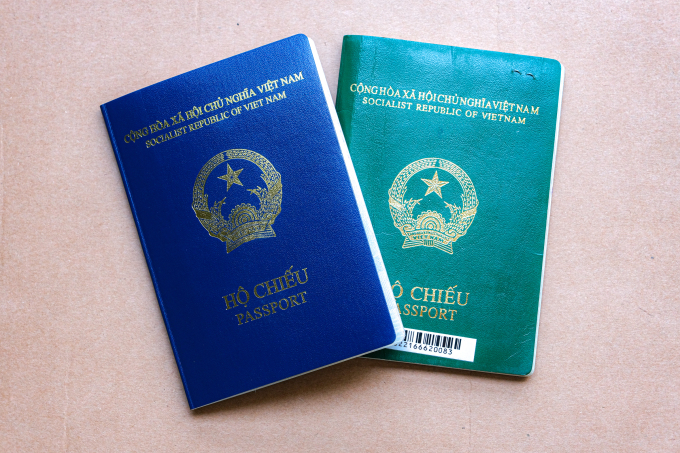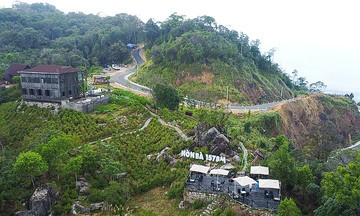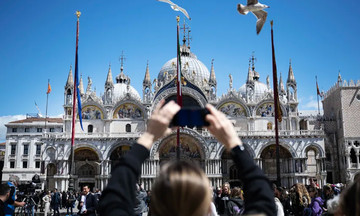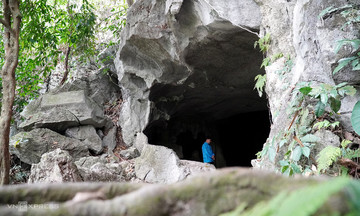According to the Henley Passport Index (HPI) QIII report released on 22/7, Vietnam now ranks 84th globally, a 7-place jump from its Q1 ranking (91st) and 3 places higher than in 2024. Vietnam's highest ranking in the HPI's 20-year history was 78th (in 2006 and 2007). Vietnam has also held the 79th (2008 and 2009), 81st (2013 and 2014), and 84th (2010 and 2025) positions.
Passport rankings reflect a nation's level of integration and openness. Vietnam's improved standing in reputable rankings enhances the credibility of its tourism sector, attracts investment, expands international cooperation, and helps boost inbound tourism.
According to Hoang Nhan Chinh, Secretary of the Tourism Advisory Board (TAB), the rise in passport ranking is primarily attributed to Vietnam's proactive, multilateral, and deeply integrated foreign policy in recent years.
 |
Vietnam's new passport (left, dark blue-purple cover) and the old version (green cover). Photo: Nguyen Minh. |
Vietnam's new passport (left, dark blue-purple cover) and the old version (green cover). Photo: Nguyen Minh.
Strengthened international relations through high-level visits by leaders of the Vietnamese Communist Party, Government, and National Assembly have enabled the diplomatic sector to negotiate visa exemption agreements and sign cooperation agreements with various destinations, significantly improving the nation's image through international activities.
Furthermore, the quality and security of Vietnamese passports have been upgraded, including the introduction of chip-embedded passports in 2023. The increasingly professional and modern immigration management system (such as automated immigration), aligned with international standards, enhances trust with partner countries.
According to the HPI, Vietnamese citizens can currently enter 51 destinations visa-free or with simplified procedures like e-visas, visas on arrival, or ETAs (electronic travel authorizations) out of a total of 227 countries and territories. This access remains the same as at the beginning of the year when Vietnam held the 91st position.
Nguyen Tien Dat, General Director of AZA Travel, suggests that the positive image projected by Vietnamese tourists abroad may be a contributing factor to Vietnam maintaining its visa-free access, even without adding new destinations.
"Vietnamese tourists behave civilly abroad, spend generously, and rarely violate local laws", Dat said.
Despite Vietnam's 7-place climb, the number of visa-free or simplified-procedure destinations remains at 51, suggesting the improved ranking may be due to other countries' declining positions.
"The unchanged number of visa-free destinations is a reminder that we still have much to do to improve the real power of the Vietnamese passport", Chinh said.
Currently, the world's most powerful passport is Singapore's, offering visa-free access to 193 destinations (down from 195 in Q1). According to experts at Mint, part of HT Media, one of India's largest media and entertainment conglomerates, Singapore's passport strength stems from several key factors: strong diplomatic ties with many countries, a safe and civilized environment, high GDP, and a low rate of citizens overstaying visas for illegal work.
For Vietnam to improve both its ranking and the number of visa-free destinations, it could learn from Singapore's model. In addition to fostering bilateral cooperation, Vietnam could expand its unilateral visa exemption list for countries with good diplomatic relations. This would not only attract international tourists but also encourage reciprocal visa-free policies from those countries. Simultaneously, the government could negotiate for other nations to offer e-visas to Vietnamese citizens as a simplified entry method.
Projecting an image of a safe and tourism-friendly nation also encourages other countries to relax entry regulations or visa requirements for Vietnamese citizens.
Vietnam also needs to focus on managing the image of its citizens abroad, minimizing illegal stays, law violations, and illegal emigration. "This significantly impacts the willingness of developed countries to cooperate", Chinh said. Outbound travel companies should provide guidance and regulations to ensure their tour groups understand and adhere to these principles.
Finally, continuous upgrades to immigration infrastructure, data digitization, and biometric integration are necessary to ensure Vietnamese citizens have transparent and reliable records when entering foreign countries.
Dat notes that safety is the most significant impression Vietnam makes on many international visitors. According to a 2024 World Economic Forum (WEF) report, Vietnam's highest-ranked indices were affordability (6th out of 119 destinations) and safety (23rd).
Everyone wants to visit a safe place, and every country welcomes tourists from safe and friendly destinations. Therefore, instead of excessively expanding visa exemptions, Vietnam can strengthen its passport through internal improvements. "Every nation wants to welcome wealthy and civilized visitors", Dat said.
Phuong Anh












